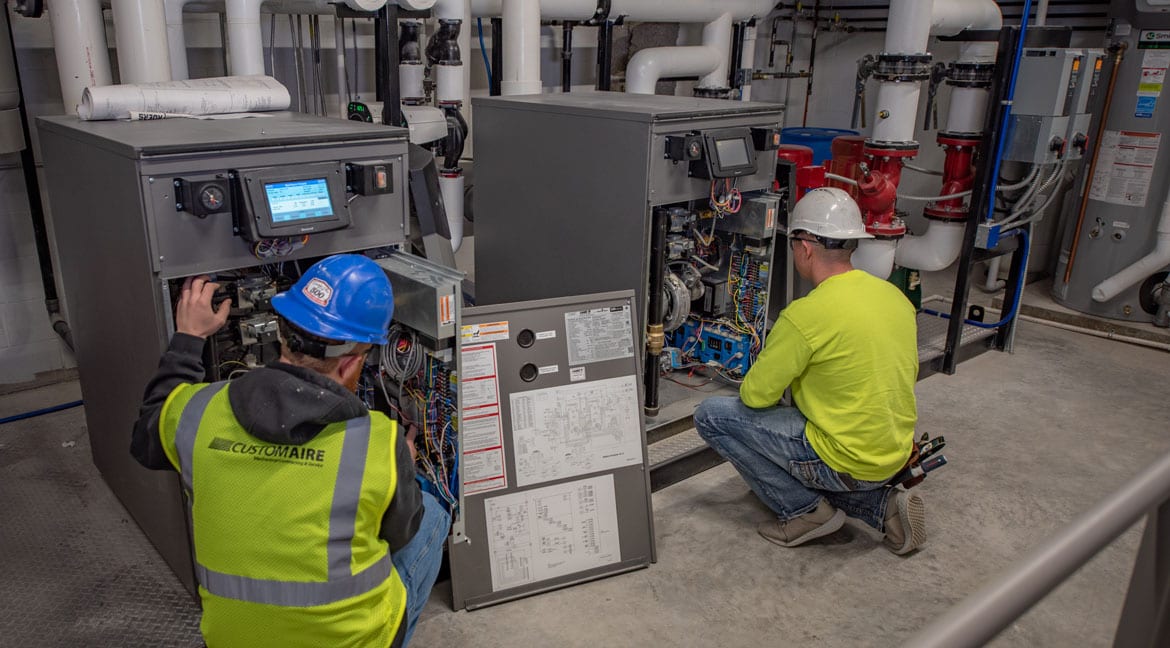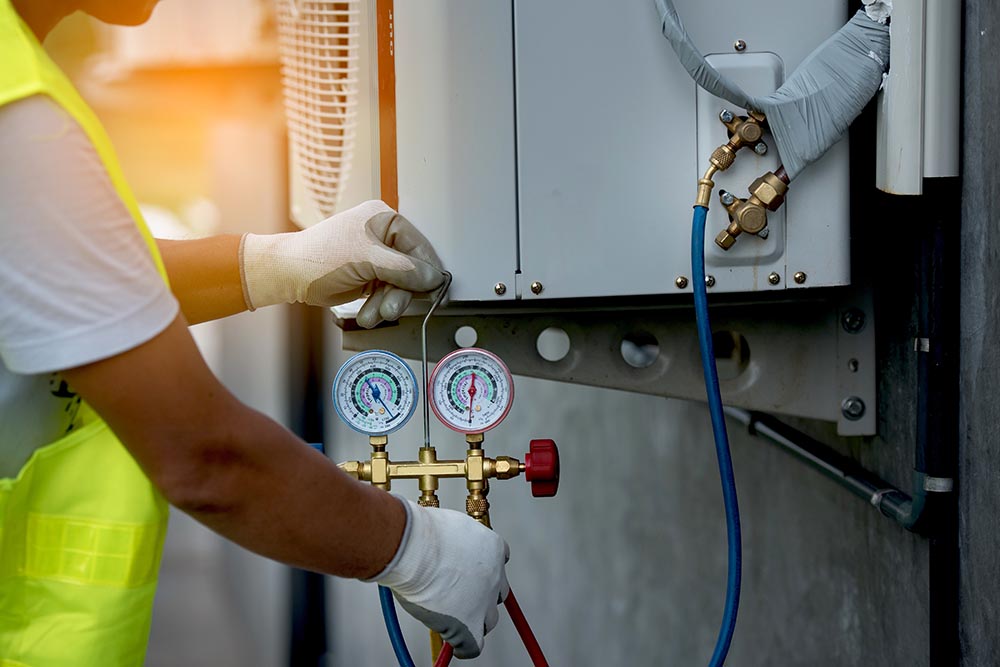Top Questions Answered About heat pump replacement ooltewah tn
Wiki Article
Selecting In Between a Heatpump and Furnace: Secret Considerations for Your A/c Demands
When assessing heating choices for HVAC requires, the choice between a heat pump and a heating system can be intricate. Each system supplies unique advantages customized to specific climates and power effectiveness goals. Understanding these differences is vital for making an enlightened choice. Trick variables such as installation costs and environmental impact better make complex the selection procedure. Which option really lines up with one's convenience and sustainability choices? The adhering to areas will check out these factors to consider in detail.Recognizing Warm Pumps: Just How They Work and Their Benefits
While numerous house owners take into consideration various heating options, understanding just how warmth pumps function and their benefits can greatly affect their choice. Warmth pumps operate by transferring warm instead of producing it. In the winter months, they draw out heat from the outside air or ground and transfer it inside your home, while in the summer, they reverse this procedure, cooling the home by eliminating warmth outside. This double functionality makes them functional for year-round environment control.One of the primary advantages of warmth pumps is their energy effectiveness. They utilize significantly less electrical power compared to standard home heating systems, possibly resulting in reduced utility expenses (heat pump service). Furthermore, heatpump have a smaller carbon impact, making them an eco-friendly choice. They additionally require less upkeep than conventional systems, contributing to lasting cost financial savings. Generally, understanding the technicians and benefits of warmth pumps can aid house owners make educated decisions regarding their home heating and cooling down requirementsExploring Heating Systems: Kinds, Procedure, and Advantages
Furnaces are available in numerous kinds, including gas, electric, and oil versions, each with distinct functional systems. Understanding these distinctions is important, as they affect effectiveness and heating efficiency. Furthermore, heaters use numerous benefits, such as constant heat outcome and integrity in chillier environments.Kinds of Heaters
Home heating systems can differ considerably in design and procedure, with furnaces being a popular selection amongst property owners. There are numerous kinds of furnaces, each using different gas resources and modern technologies. Gas heaters prevail, leveraging all-natural gas to create warm efficiently. Electric furnaces, on the various other hand, utilize electric resistance to generate warmth, commonly favored for their simple setup. Oil heating systems, while less usual, work in locations with minimal gas gain access to (heat pump service). Additionally, condensing heating systems optimize power effectiveness by recycling and capturing exhaust gases. Each type runs through a system of warmth exchangers and ductwork to distribute warm air throughout a home. Understanding the distinctions between these heating system kinds is necessary for informed HVAC decisionsBenefits of Heaters
For property owners seeking trustworthy warmth during chilly months, the benefits of furnaces are significant. Heating systems supply constant home heating, making certain also temperatures throughout the home. They are particularly efficient in extreme cool, frequently outshining warm pumps in icy conditions. Numerous kinds, consisting of gas, electric, and oil furnaces, provide versatility to meet diverse needs and preferences.Furnaces additionally often tend to have reduced preliminary setup prices contrasted to warm pumps, making them an extra obtainable alternative for numerous. Their robust layout adds to a much longer lifespan, with lots of units lasting over 15 years with proper maintenance. Additionally, modern heaters are usually geared up with advanced innovation for enhanced efficiency, which can result in minimized power costs. Generally, furnaces remain a dependable choice for efficient home heating.
Power Performance: Comparing Warmth Pumps and Furnaces
When comparing power efficiency in between warmth pumps and furnaces, the Seasonal Energy Performance Ratio (SEER) plays a crucial role in identifying efficiency. Additionally, an operational price analysis exposes the long-term financial effects of each system. Comprehending these factors can guide homeowners in making informed choices regarding their home heating options.Seasonal Power Effectiveness Proportion
Power performance plays a necessary function in the decision-making procedure in between heatpump and furnaces, particularly when taking into consideration the Seasonal Energy Efficiency Proportion (SEER) This metric actions the cooling efficiency of warmth pumps over an entire cooling period, supplying a standardized method to examine performance. Greater SEER rankings suggest higher power efficiency, translating to reduced energy consumption and lowered energy bills. In comparison, heaters are typically examined utilizing the Yearly Gas Utilization Performance (AFUE) score, which reflects home heating efficiency. When contrasting these two systems, property owners should focus on SEER scores for heat pumps, as they directly impact overall power financial savings and environmental sustainability. A complete understanding of SEER can notably affect the long-term satisfaction and cost-effectiveness of the picked cooling and heating service.Operational Price Evaluation
Understanding the functional costs related to warmth pumps and heaters is important for homeowners reviewing their choices. Heatpump commonly offer greater energy performance, converting electrical energy right into warmth with very little waste. This causes lower monthly energy costs, especially in moderate environments. On the other hand, conventional heating systems, specifically gas versions, may have reduced upfront prices but can sustain higher functional expenditures with time as a result of fuel rates and efficiency ratings.Moreover, heatpump can operate as both home heating and cooling down systems, possibly reducing the requirement for separate HVAC devices. While first financial investments for warmth pumps might be greater, their lasting savings in energy efficiency can make them a more cost-effective option for many households. Mindful analysis of neighborhood energy prices is important to establish the very best choice.Installment Prices: What to Anticipate for every Heating System
Installation costs for furnace can vary considerably in between heatpump and heating systems, influencing property owners' decisions. Heatpump typically have higher in advance setup prices, generally varying from $3,500 to $8,000, depending on the unit dimension and intricacy of setup. This consists of the exterior device, indoor handling system, and essential ductwork adjustments. Conversely, furnaces have a tendency to have lower initial expenses, averaging in between $2,500 and $6,000, which can be appealing for budget-conscious property owners. Nonetheless, setup expenses can boost if extensive ductwork i was reading this is required.Moreover, the choice of gas type for heaters-- all-natural gas, propane, or electric-- can also influence installation costs. While heatpump provide power efficiency, their initial investment might discourage some customers. Ultimately, evaluating installment costs together with long-term cost savings and performance will certainly assist home owners in making educated choices concerning their furnace.Climate Considerations: Which System Does Better in Your Location
How do climate problems affect the efficiency of heating unit? The performance of heatpump and furnaces can differ considerably relying on the regional environment. In moderate environments, heatpump excel by efficiently moving warmth from the outside air, making them an energy-saving choice. Their efficiency diminishes in incredibly chilly temperatures, where they may have a hard time to remove adequate warmth. Alternatively, furnaces, especially gas versions, provide dependable and regular warmth no matter of outside conditions, making them better in cooler regions.In areas that experience milder winter seasons, heatpump can operate effectively year-round, providing both heating and cooling. In contrast, areas with rough wintertimes commonly take advantage of the effectiveness of heating systems. Eventually, understanding the neighborhood climate is necessary when choosing between a warmth pump and a heating system, as it straight influences their operational performance and general performance.Upkeep Needs: Long-Term Look After Warmth Pumps vs. Furnaces
While both heatpump and heating systems need normal maintenance to guarantee peak efficiency, their specific needs and care regimens vary significantly. Furnaces typically need less constant interest, with annual inspections being adequate to check for gas leakages, clean filters, and evaluate overall functionality. Their less complex design commonly enables uncomplicated repairs.In comparison, heat pumps necessitate semiannual maintenance due to their double duty in heating and air conditioning. This consists of cleaning coils, examining refrigerant levels, and guaranteeing that both the indoor and exterior systems function at their best. Furthermore, heatpump maintenance frequently involves more detailed components, making professional maintenance essential.Neglecting upkeep can cause diminished effectiveness and enhanced energy prices for both systems. Eventually, home owners need to think about these long-term treatment requirements when picking in between a heat pump anchor and a heating system, as proactive maintenance can expand the life expectancy and performance of either system significantly.Environmental Influence: Selecting a Sustainable Home Heating Alternative
The environmental impact of furnace is an important assessment for homeowners looking for sustainable choices. Heat pumps are normally extra energy-efficient than typical heaters, as they transfer warm instead than create it, substantially minimizing carbon discharges. By utilizing eco-friendly power resources, such as geothermal or air-source heatpump, home owners can better decrease their environmental footprint.On the various other hand, all-natural gas furnaces give off greenhouse gases and add to air pollution, though they usually supply greater heat result. Nonetheless, innovations in modern technology have resulted in the development of high-efficiency heating systems that decrease emissions.Ultimately, selecting a heating unit includes weighing performance versus environmental effect. Home owners are motivated to mirror on local energy resources and motivations for sustainable systems, making sure a choice that straightens with both personal convenience and environmental duty. The choice influences not only instant comfort but additionally long-term sustainability and environmental health and wellness.Frequently Asked Questions
Just How Long Do Warm Pumps and Furnaces Generally Last?
The lifespan of heatpump commonly varies from 15 to two decades, while heating systems can last between 15 to three decades. Normal maintenance significantly impacts their durability and effectiveness in giving heating remedies.Can I Utilize a Warm Pump in Incredibly Cold Climates?
Heat pumps can run in very chilly environments, but their effectiveness decreases as temperatures decline. In such problems, extra heating sources may be required to keep comfortable interior temperatures and assure peak performance.
What Is the Noise Level of Warmth Pumps Versus Furnaces?
The sound degrees of heatpump and heating systems differ considerably. Typically, heatpump run more quietly than standard heaters, making them more suitable for those conscious appear, while heating systems may generate louder click for info operational sounds during home heating cycles.
Are Warm Pumps Suitable for Both Cooling And Heating?
Heatpump are indeed ideal for both cooling and heating (heat pump installation ooltewah tn). They function by moving warmth, giving reliable temperature level control year-round, making them a flexible selection for home owners seeking an all-in-one cooling and heating solutionWhat Dimension Heater Do I Need for My Home?
Identifying the suitable dimension home heating system for a home requires evaluating variables such as square footage, insulation high quality, regional environment, and the home's format. Consulting a specialist can guarantee an exact evaluation and excellent comfort. Warmth pumps usually provide higher power effectiveness, transforming electric energy right into warm with marginal waste. In modest environments, warm pumps stand out by effectively transferring heat from the outside air, making them an energy-saving alternative. On the other hand, furnaces, especially gas models, supply regular and trusted warm no matter of outdoor problems, making them preferable in colder regions.In locations that experience milder winters, warm pumps can run efficiently year-round, giving both heating and air conditioning. Heat pumps are usually extra energy-efficient than typical heaters, as they transfer warm instead than produce it, greatly lowering carbon exhausts. By making use of sustainable energy sources, such as geothermal or air-source warm pumps, house owners can further reduce their ecological footprint.On the other hand, all-natural gas heaters discharge greenhouse gases and add to air pollution, though they frequently supply greater warm outcome.Report this wiki page